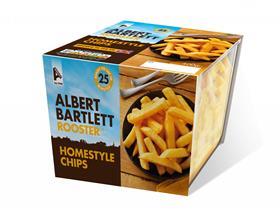
Can new product development fuel a potato sector recovery?
Kim Malley:Potatoes are a naturally versatile food that are perceived by consumers to be relatively inexpensive. However, despite a recovery of three per cent in the volume of fresh potatoes bought by UK shoppers over the last four years, according to Kantar Worldpanel, the retail market for potatoes has shrunk over the long term amid increased competition for the carbohydrate space on our plates.
The top three elements that shoppers list as ‘off-putting’ when it comes to fresh potatoes relate to convenience [AHDB/YouGov, Consumer Tracker, August 2018], while much of the new product development in the potato sector has been focused on prepared categories like chilled and frozen.
How are consumer eating trends providing scope for new products?
KM:Currently in the UK only 35 per cent of consumers claim they enjoy and are confident with cooking a variety of dishes. This leaves 32 per cent who claim they have a limited repertoire of things they feel confident cooking and 33 per cent who either do not enjoy or have a basic or no level of cooking skill. Coupled with a lack of cooking confidence, lifestyles are also changing, with significant growth in one to two-person households. There is a drive for convenience, variety and health, while also still being enjoyable and value for money.
What are the main drivers of potato sales at the moment?
KM:While 59 per cent of consumers believe the best aspect of buying fresh potatoes is versatility, the third, and growing, reason is value for money at 45 per cent.
Taste is another strength of fresh potatoes with half of consumers claiming it is the best aspect of buying fresh potatoes. The at-home usage of fresh potatoes for baked potato meals and vegetarian dishes has increased year on year [Kantar Worldpanel Usage, 52 w/e May 2018], however, this is at the expense of more traditional meals. As a majority of consumers lack confidence when cooking in general, further inspiration around how to use fresh potatoes in meals is needed.
How are the different sectors of the UK potato market evolving?
KM:According to a study in mid-2018 by SCALA, the UK’s biggest grocers are reducing their product ranges to compete with discounters. Currently, discounters stock-keep 7,500 units compared to 30,000 for a traditional supermarket. This simpler and more streamlined approach is coupled with market share growth for discounters.
Crisps are the fastest-growing potato category in both value and volume, according to Kantar Worldpanel. In the year ending November 2018 value sales for the category grew by 4.5 per cent and volume sales were up 5.2 per cent. Premiumisation in this sector is driving performance with hand-cooked crisps and sharing bags performing strongly in the last year.
The frozen potato sector is now worth £735m with 63 per cent of the value coming from frozen chips and 37 per cent from other frozen potato products. The sector is growing in value by 3.2 per cent year on year and by 0.6 per cent in volume.
The volume growth is coming purely from frozen chips, which have seen a turnaround in performance due to more premium offerings in the market appealing to older consumers and smaller households as opposed to justchildren.The chilled potato sector represents a small proportion of the total potato market at nine per cent, but it is an important value-added segment. Value growth of 3.9 per cent for the year ending August 2018 is driven by increased volumes (+1.7 per cent) and rising price (+2.2 per cent). The convenience of frozen and chilled potatoes is why consumers are turning more to these categories.
Do you see opportunities for further growth ahead?
KM:Opportunity may lie in retaining and promoting nutritional advantages while producing options that fit consumers’ busy lives. Similarly, we have seen trends in the US to offer reduced carbohydrate options, rather than carbohydrate free. An example is a pre-made potato and cauliflower mash.
The challenge for the potato sector, whether it is opening new avenues or building on the recent success in premium and cuisine-based convenience options, will be penetrating new products into the crowded retail market.
With a nutritious and affordable base product, which is successfully grown in the UK, there is every chance that the potato sector can rise to the challenge.



